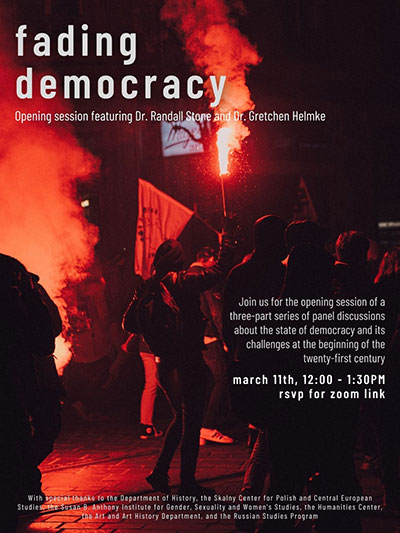Fading Democracy
Thursday, March 11, 2021
Noon–1:30 p.m.
Virtual Event

We are pleased to invite you to attend the opening session of “Fading Democracy,” a three-part series of online panel discussions about the state of democracy and its challenges at the beginning of the twenty-first century.
The first conversation will be between two University of Rochester professors in the Department of Political Science, Dr. Gretchen Helmke and Dr. Randall Stone, about the decline of democracy across the globe and the international and domestic factors that appear to be causing it. It will be aired on Thursday, March 11, 2021 from noon–1:30 p.m. over Zoom.
Please RSVP online by Wednesday, March 10.
You will receive confirmation of your registration. The link to the event will be sent in a reminder email on the 10th.
About the Speakers
Gretchen Helmke focuses her research on political institutions, democratic consolidation and erosion, the rule of law, and Latin American politics. Her most recent book is Institutions on the Edge: The Origins and Consequences of Institutional Instability in Latin America.She is co-founder of the Bright Line Watch project, which monitors threats to democracy in the United States and in the world.
Randall Stone studies international organizations and political economy and directs the Skalny Center for Polish and Central European Studies. His most recent book is Controlling Institutions: International Organizations and the Global Economy (2011). He is currently writing a book about the interactions between multinational corporations and international institutions.
About the Series
Concerned about the state of democracy and its diminishing reach at the beginning of the twenty-first century, the PhD students of the Department of History at the University of Rochester have developed an interdisciplinary initiative to organize a series of Zoom panel discussions about the collective “fading of democracy” in numerous European countries and its national and international repercussions. We intend to highlight the historical background and mutual interdependence of the present critical situations in Europe and in the United States. We believe that it is important to the people in the United States to understand and examine the mechanisms which brought the reversal of democratic governments towards authoritarianism.
The series continues on April 9 from noon-1:30 p.m., when Tanya Bakhmetyeva (SBAI) will chair a panel titled “The Politics of Gender and Sexuality.” Her guests will be activists and scholars from Eastern Europe; the focus will be on women’s reproductive rights and LGBTQ+ rights in selected countries, especially in Poland, Belarus, and Russia. Save the date! Information on the rest of the series is forthcoming.
The series is organized by the PhD students of the Department of History and co-sponsored by the Department of History, the Skalny Center for Polish and Central European Studies, The Susan B. Anthony Institute for Gender, Sexuality, and Women's Studies, the Humanities Center, the Department of Art and Art History, and the Russian Studies Program.
